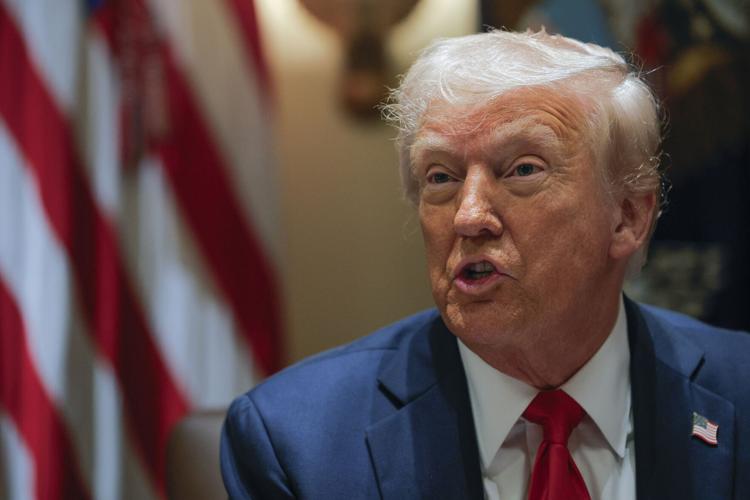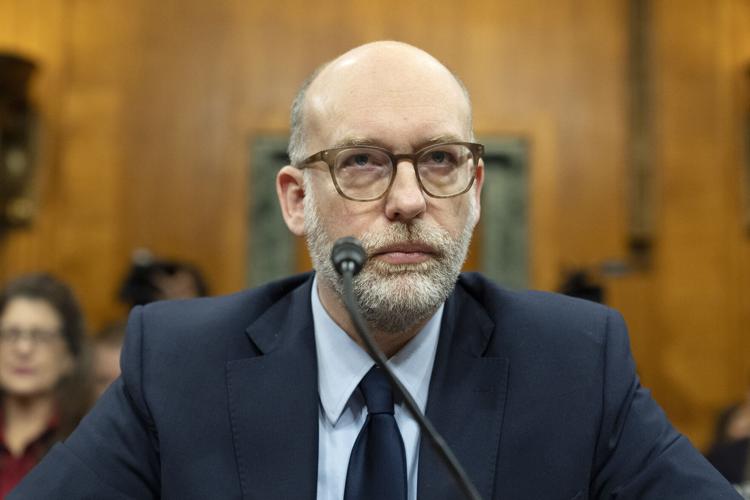WASHINGTON 鈥� Federal agencies must develop plans to eliminate employee positions, according to a memo distributed Wednesday by President Donald Trump鈥檚 administration that sets in motion what could become a sweeping realignment of American government.
The memo expands the Republican president鈥檚 effort to downsize the federal workforce, which he describes as an impediment to his agenda. Thousands of probationary employees were already fired, and now his administration is turning its attention to career officials with civil service protection.
"We're cutting down the size of government. We have to," Trump said during the first Cabinet meeting of his second term.
About 80% of federal workers live outside the Washington area, and government services 鈥� patent approvals, food inspections, park maintenance and more 鈥� could be hindered depending on how cuts are handled.
People are also reading…
Labor unions, Democratic state leaders and other organizations have tried, with some success, to slow Trump down with litigation while Republicans grow more concerned about how a slash-and-burn strategy could affect their constituents.
"Once you do this damage, it's going to be incredibly hard to rebuild the capacity of these organizations," said Don Moynihan, a public policy professor at the University of Michigan. "It's not like you can turn the switch back on and everything is going to be the way it was before."
Agencies were directed to submit plans by March 13 for what is known as a reduction in force, which would not only lay off employees but eliminate the position. The result could be extensive changes in how government functions.
No specific targets for cutbacks were included in the memo. However, as an example, Trump said the Environmental Protection Agency could reduce its staff by 65%.
More plans are due on April 14, when agencies are expected to outline how they will consolidate management, become more efficient and potentially relocate offices to parts of the country that are less expensive than Washington. The memo said agencies should implement their plans by Sept. 30.
Administration officials framed their effort as a cost-saving measure with a clear ideological goal.
"The federal government is costly, inefficient, and deeply in debt. At the same time, it is not producing results for the American public," said the memo from Russell Vought, director of the White House's Office of Management and Budget, and Charles Ezell, acting director of the Office of Personnel Management, which functions as a human resources agency. "Instead, tax dollars are being siphoned off to fund unproductive and unnecessary programs that benefit radical interest groups while hurting hard-working American citizens."
Vought was an author of Project 2025, a conservative blueprint for Trump's second term, and he has advocated for centralizing power under the presidency and dismantling federal bureaucracy.
Moynihan described the memo as a "backdoor way" of reducing the size of government since Congress hasn't passed any legislation to cut programs.
"There's a fundamental realignment of power here," he said. "This administration is saying we have much more power than any previous administration when it comes to deciding how government works."
Kevin Owen, an employment lawyer who represents federal workers, compared the administration's initiative to the kind of disruptions that are caused by government shutdowns during congressional budget standoffs.
"This looks like a plan for a significant and shocking reduction of the federal workforce that I don't think the American people are prepared for," Owen said. "It's going to cripple a lot of government functions."
He said Trump and his allies focused on speed rather than precision as they overhaul the government.
"Their plan is to do the damage and get sued," he said. If a court ultimately rules against them, "by that point, they would have gotten what they wanted in the interim."
Trump foreshadowed the effort in a recent executive order that he signed with Elon Musk, the billionaire entrepreneur who oversees the Department of Government Efficiency. The order said agency leaders "shall promptly undertake preparations to initiate large-scale reductions in force."
Some departments already started this process. The General Services Administration, which handles federal real estate, told employees on Monday that a reduction in force was underway and they would do "everything in our power to make your departure fair and dignified."
Law enforcement, national security, public safety, military positions and U.S. Postal Service positions are exempt.
Musk's operation became more powerful on Wednesday with a new executive order signed by Trump. He directed agencies to develop new systems for distributing and justifying payments so they could be monitored by DOGE representatives. Employee travel is being limited and agency credit cards are being frozen unless they鈥檙e used for disaster relief or supervisors create an exception.


















